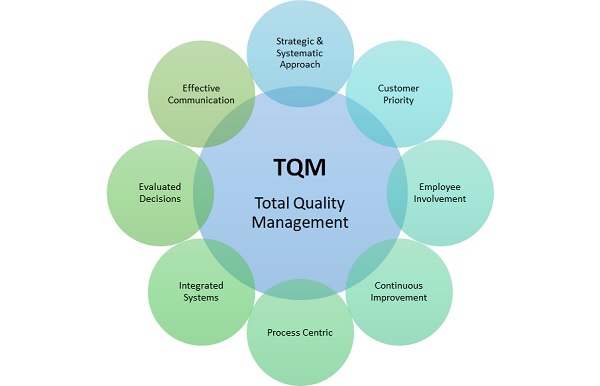- Business Concepts ›
- Operations and Supply Chain ›
- Total Quality Management (TQM)
Total Quality Management (TQM)
Definition, Importance, Components & Example
This article covers meaning & overview of Total Quality Management (TQM) from operations perspective.
What is meant by Total Quality Management (TQM)?
Total Quality Management or TQM is a business strategy which focuses on having a high quality in operations, finished goods & customer delivery through planned and holistic approach which prioritizes the customer expectations through continuous improvement. TQM is aimed towards customer organization and the way organizations do business. It defines newer ideas to enhance quality and customer related processes.
Total Quality Management (TQM) was coined to describe Japanese-style management approaches to quality improvement. Since then, total quality management has taken on many meanings in operations management & supply chain.
Importance of Total Quality Management
Customers always seek highest quality in terms of product, service & experience. Every company focuses on delivering customer needs, and offering a high value product. Hence, to ensure high customer satisfaction, companies need to provide high quality goods & services, but also need to make sure it is cost effective & efficient.
This is where TQM plays a pivotal role in a company’s long-term strategy. Total quality management is driven by contribution & quality improvements by all functions or departments. Quality improvements done in production processes, inventory management, finished goods, work culture etc. all form a part of TQM.

Read More
Components of TQM
The key components of total quality management are:
1. Strategic & Systematic Approach
Strategy to improve overall business processes is critical for high quality goods & services. If the senior management is not involved, TQM will fail. The management should strategize the processes for all functions. A quality council should be formed comprising of the CEO and senior management to decide on the core values to help decide the culture of the organization.
2. Customer Priority
A customer expects a company should deliver high quality, high flexibility, high service level, short lead times, low variability in meeting targets and low cost. The customer expects improvement on all these parameters, and hence are critical under total quality management.
3. Employee Involvement
Providing training to help employees acquire necessary skills, cross functional training, continuous process improvement and other statistical tools for people driven improvement is important for TQM. Local ownership is aimed at taking ownership for the processes people are associated with.
4. Continuous Improvement
Despite having business processes in place, there is always a mechanism to improve existing processes.
This can be in terms of cost cutting, process improvements, improving lead times, increasing efficiency etc.
5. Business Centric
TQM is largely driven by improving business processes. Some performance measures which can help improve overall business are:
a) Quantity improvement- Increasing the number of units produced during a period of time.
b) Cost- The resources needed to produce given output.
c) Time/Delivery – Ability to deliver the product or service within the mentioned time.
d) Qualitative aspects- Theses focus on functions, aesthetics, accuracy etc.
6. Integrated Systems
To ensure there is an overall improvement in business, quality & its processes, it is critical to have a centralized system as a part of total quality management. Having a centralized integrated system is beneficial as it empowers the different business verticals & senior management to monitor, evaluate & improve all different business processes.
7. Evaluated Decisions
Quality & processes can be improved only based on systematic understanding through data collection, measuring output & taking informed decisions. Once a company has collected enough information of different department & their processes, it can take a decision to increase overall productivity, quality & efficiency.
8. Effective Communication
TQM can be delivered only when all processes, quality standards, minimum requirement guidelines are well communicated with all the different employees. Also, these qualities can be used as a USP to sell products & services to customers as well.
Example of Total Quality Management (TQM)
The biggest & most well defined example of TQM is by Toyota Motors corporation. In Toyota, they follow the Kanban system of manufacturing, which focuses on keeping minimum inventory, quality control at all stages, JIT processes & continuous evaluation of assembly line processes. This ensures that the company always provides high quality products to its customers.
Hence, this concludes the definition of Total Quality Management (TQM) along with its overview.
This article has been researched & authored by the Business Concepts Team which comprises of MBA students, management professionals, and industry experts. It has been reviewed & published by the MBA Skool Team. The content on MBA Skool has been created for educational & academic purpose only.
Browse the definition and meaning of more similar terms. The Management Dictionary covers over 1800 business concepts from 5 categories.
Continue Reading:
What is MBA Skool?About Us
MBA Skool is a Knowledge Resource for Management Students, Aspirants & Professionals.
Business Courses
Quizzes & Skills
Quizzes test your expertise in business and Skill tests evaluate your management traits
Related Content
All Business Sections
Write for Us